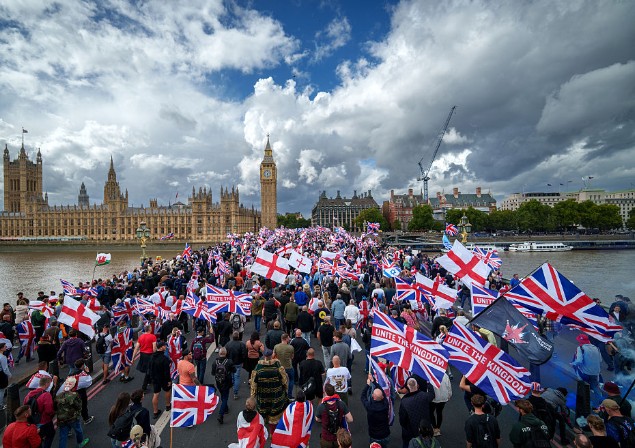Police and Protesters Scuffle as 110,000 Join Anti Migrant London Protest

More than 100,000 people marched through central London on Saturday in what has been described as one of the UK’s biggest right wing demonstrations in recent decades. The event, organized by far‑right activist Tommy Robinson under the banner “Unite the Kingdom”, focused on anti‑immigration messages and free speech. Protesters carried flags of England and Britain, as well as some American and Israeli flags, and many wore “MAGA” hats.
The Metropolitan Police estimated the crowd at around 110,000, a turnout that reportedly overwhelmed expectations police sources said parts of the approved route, especially Whitehall, were too full to accommodate all protesters.A counter‑protest was organized by Stand Up to Racism, drawing about 5,000 people.
Clashes & Police Response
Although much of the march was peaceful, tensions boiled over in several places. Officers said some protesters attempted to veer off the approved route, trying to enter “sterile areas” meant to keep opposing groups apart. Confrontations involved hurling of bottles and flares, physical assaults (kicks, punches), and verbal abuse. The police described the violence from some participants as “unacceptable.”
A total of 26 officers were injured, four of them seriously, in the course of the events. Around 25 arrests were made, with authorities warning more are likely as investigations continue.
Organisers & Messaging
Tommy Robinson (real name Stephen Yaxley‑Lennon) delivered a speech framing the march as a defense of British heritage, free speech, and national identity. In his address, he claimed that migration policies had eroded rights of native Britons and called for political change. Supporters echoed such themes, carrying signs reading “send them home” among others.
Besides domestic figures, the rally attracted international voices. Elon Musk addressed attendees via video linkage, criticizing the UK government and lamenting what he described as cultural erosion. French far‑right politician Éric Zemmour also appeared via video, invoking ideas such as the “great replacement” theory.
Political & Social Context
Immigration has increasingly become one of the UK’s most talked about and divisive issues. Record numbers of asylum applications and migrant arrivals via small boats across the Channel have stirred strong public emotions. This march, following a summer of anti‑immigration protests including outside hotels where migrants were being housed reflects significant social tensions.
Prime Minister Keir Starmer acknowledged the right to peaceful protest but condemned the violence and what he called the misuse of national symbols to instil fear. He emphasized Britain’s values of diversity and tolerance.
Why It Matters & What Comes Next
The scale of this protest marks a possible turning point for the far‑right in Britain. Analysts warn that such large mobilisations give increased visibility and legitimacy to fringe views that previously operated on the margins. The involvement of foreign figures like Elon Musk furthers this sense of global resonance with the UK’s far‑right movements.
Questions remain about how law enforcement and politicians will respond. There may be tighter regulation of protests, especially in sensitive areas. Legal action against those who broke the route or engaged in violence seems likely. Also under scrutiny is the interplay between online radicalisation, political speech, and public safety.

philbet https://www.philbetts.net